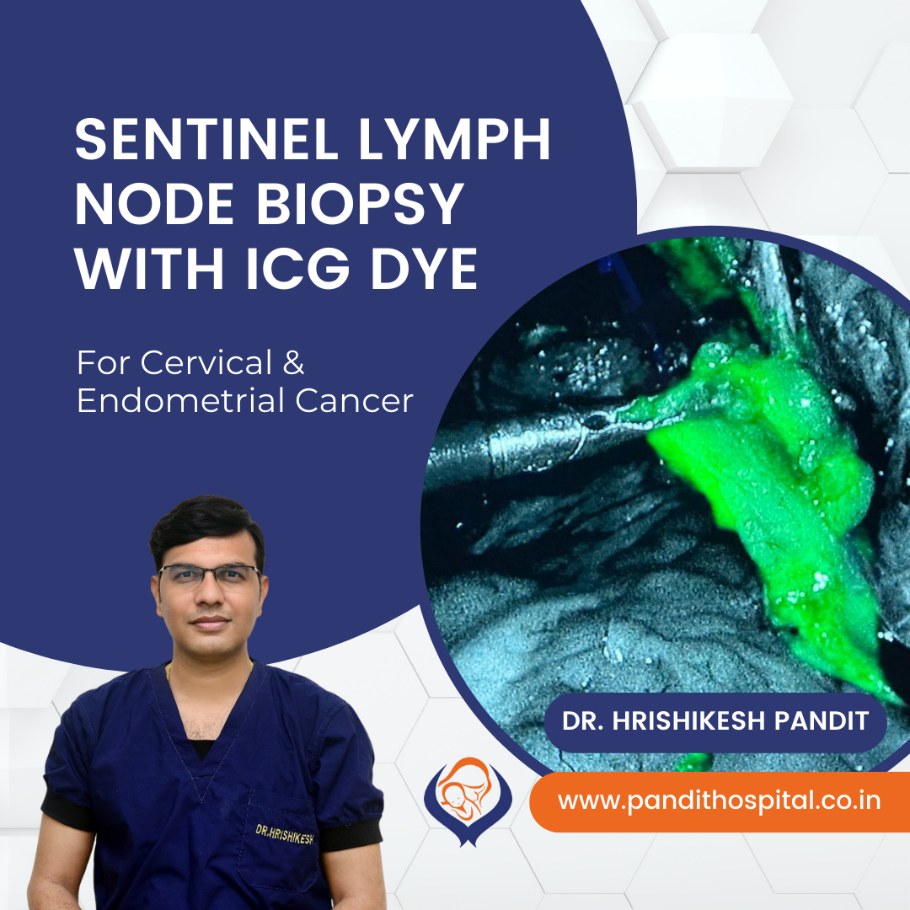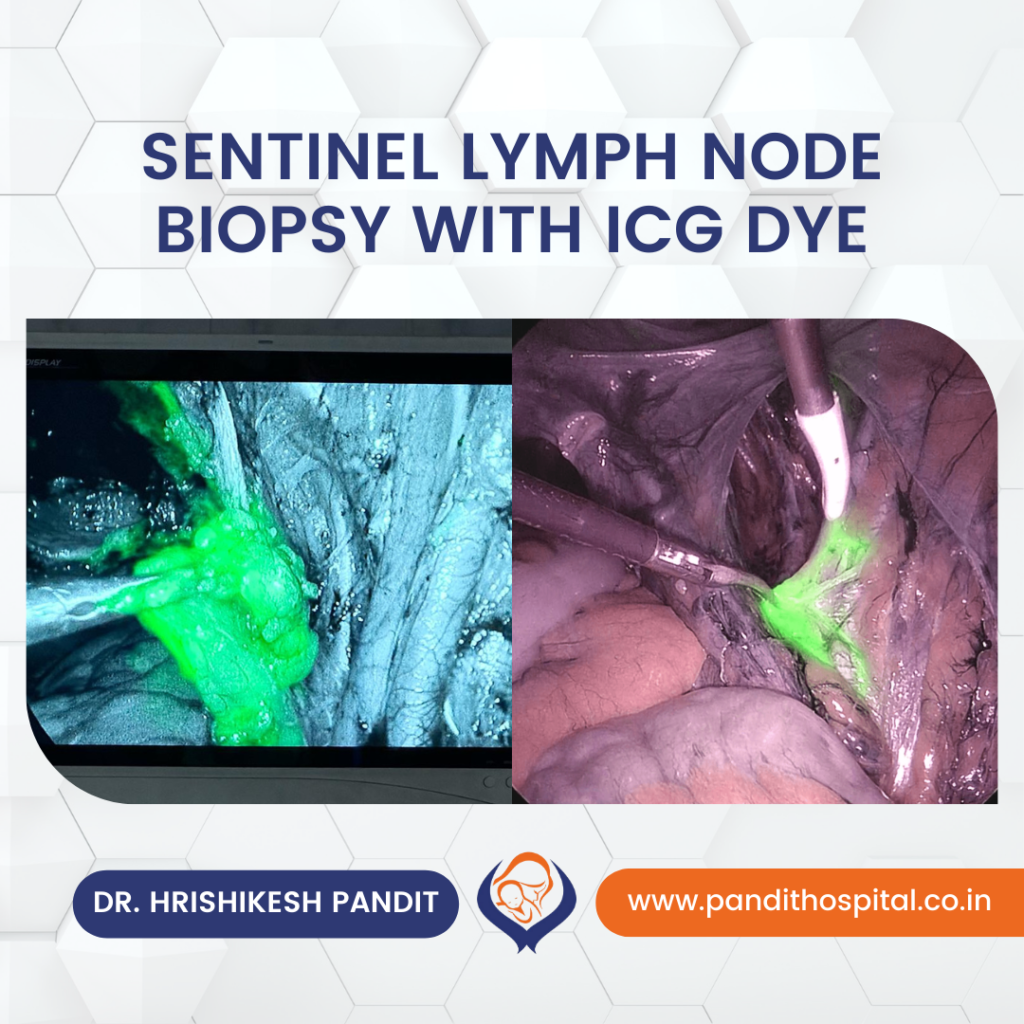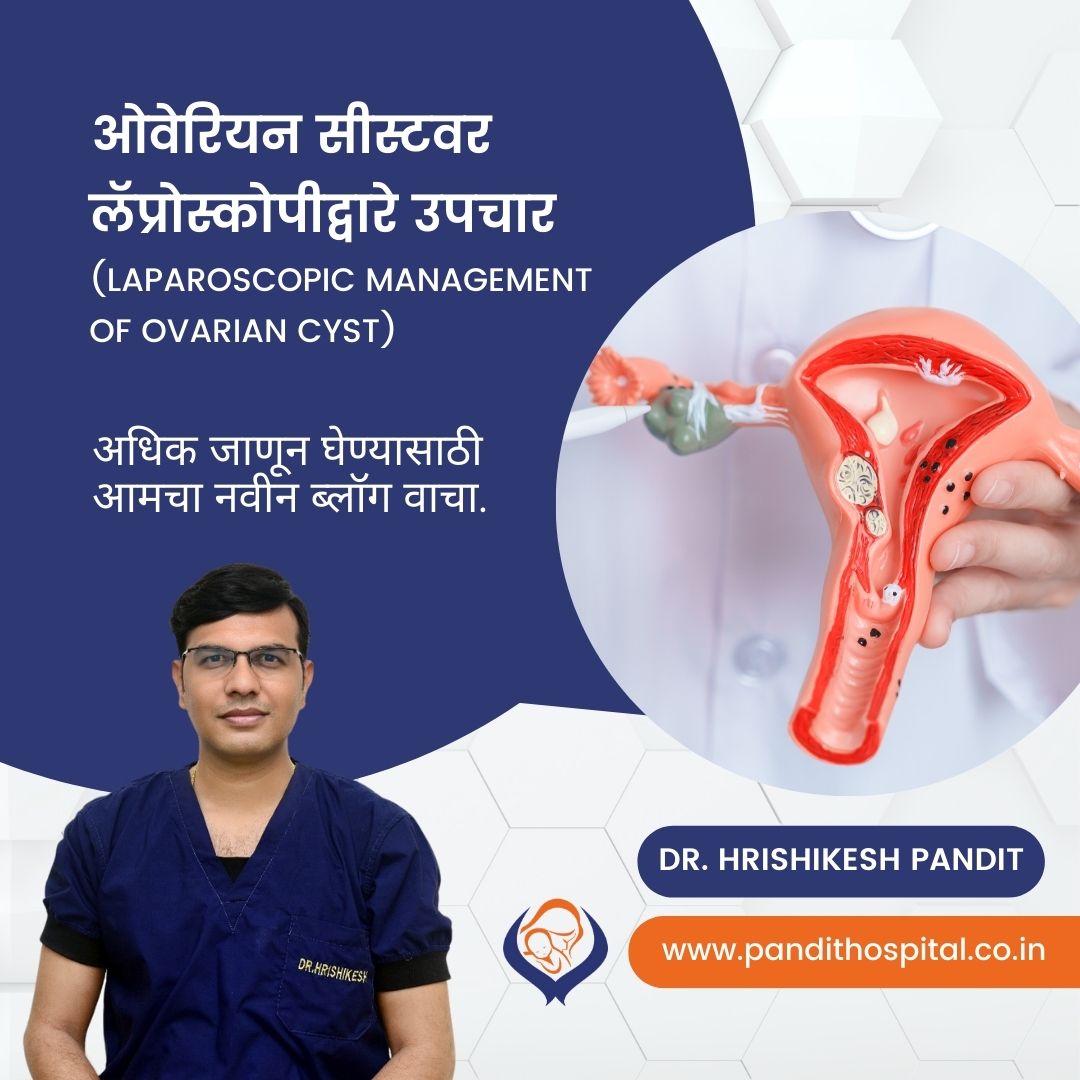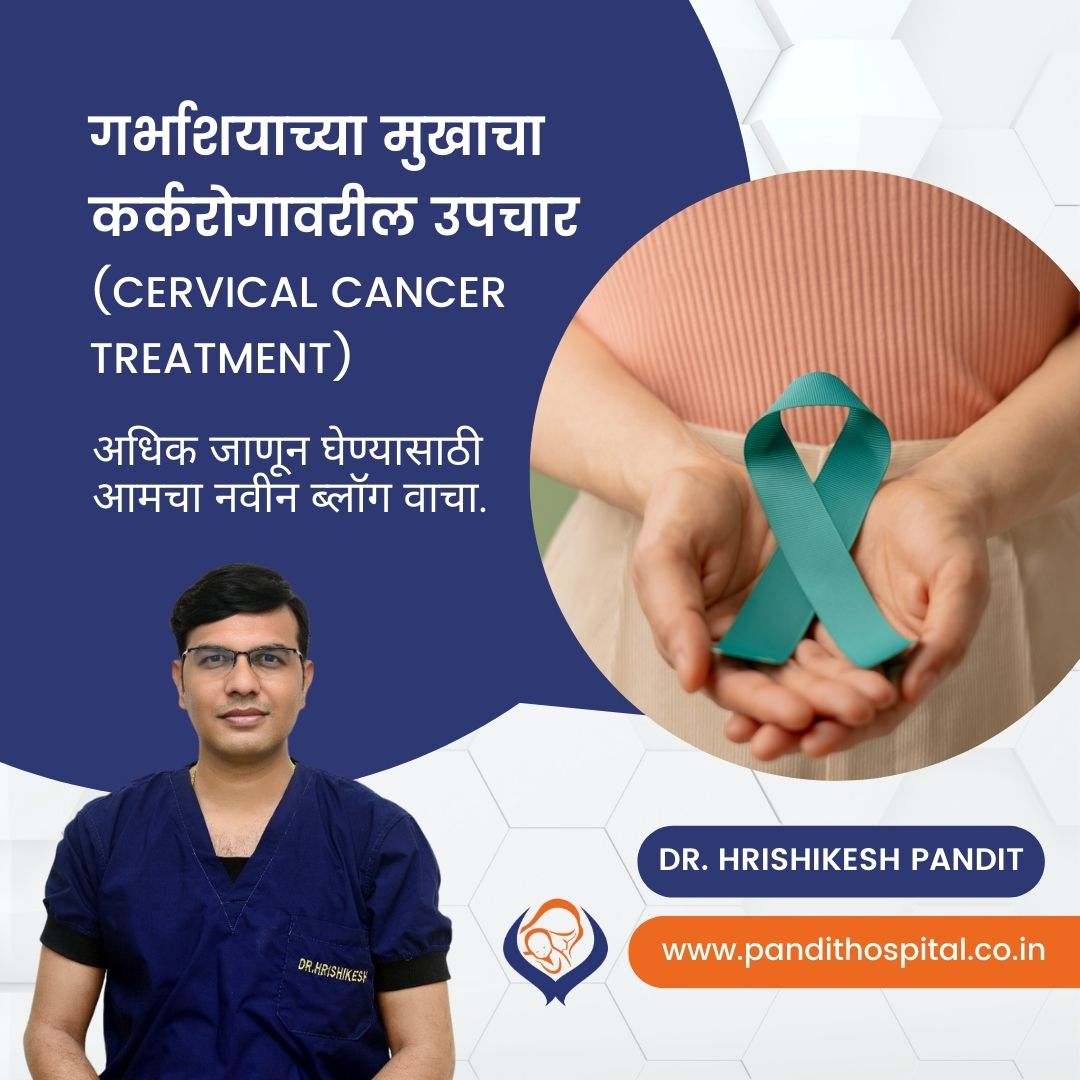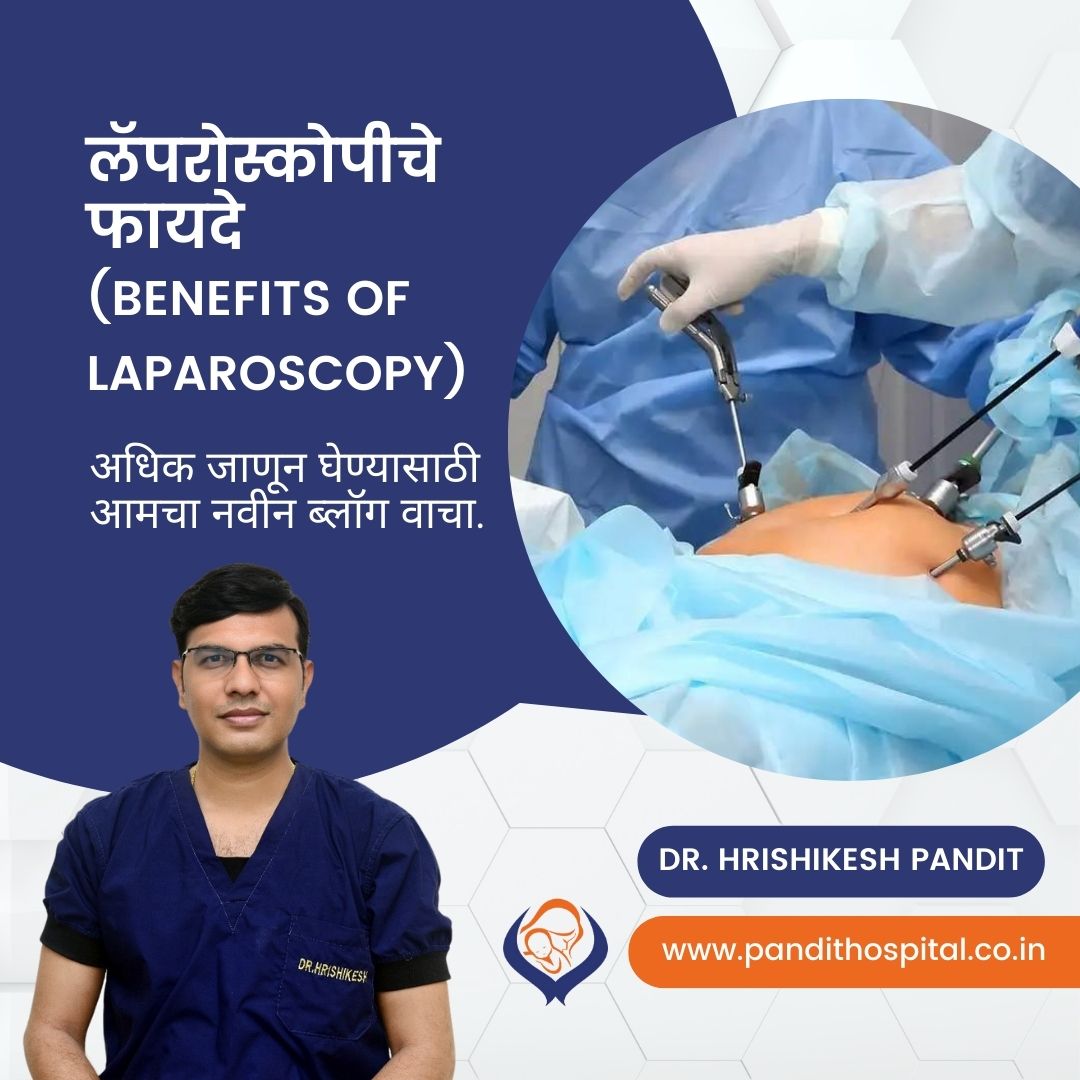In the field of cancer treatment, early detection and accurate staging are vital for successful outcomes. For patients battling cervical and endometrial cancer, a groundbreaking technology known as Sentinel Lymph Node Biopsy (SLNB) with Indocyanine Green (ICG) dye has emerged as a game-changer. Dr. Hrishikesh Pandit’s Pandit Hospital in Ahmednagar is at the forefront of offering this cutting-edge procedure, revolutionizing cancer care and improving patients’ lives.
Sentinel Lymph Node Biopsy is a minimally invasive surgical technique used to assess whether cancer has spread to the nearby lymph nodes, a crucial factor in determining the stage of cervical and endometrial cancers. Traditionally, a complete lymph node dissection was performed, resulting in potential complications. However, with SLNB, only the “sentinel” nodes, the first nodes that the cancer cells are likely to reach, are removed and examined.
The use of Indocyanine Green (ICG) dye further elevates the precision of SLNB. ICG is a fluorescent dye that selectively accumulates in the sentinel lymph nodes, making them glow under near-infrared light. This allows surgeons to accurately identify and remove these nodes with utmost precision, reducing the need for extensive lymph node removal.
- Enhanced Accuracy: SLNB with ICG dye offers highly accurate results, ensuring that any affected lymph nodes are promptly identified and treated, while minimizing unnecessary removal of healthy nodes.
- Minimally Invasive: Compared to traditional lymph node dissection, SLNB is a minimally invasive procedure, resulting in reduced surgical trauma, quicker recovery, and lower risk of complications.
- Tailored Treatment: Accurate staging through SLNB helps oncologists develop personalized treatment plans, optimizing the chances of successful outcomes. Plus there is no prognostic difference between complete pelvic lymphadenectomy and Sentinel lymphadenectomy
- Improved Quality of Life: SLNB’s precision leads to a lower risk of lymphedema, a common complication associated with lymph node removal, thereby improving patients’ post-surgery quality of life.
Dr. Hrishikesh Pandit’s Pandit Hospital in Ahmednagar is proud to be one of the few centers in the region offering this cutting-edge technology. Dr. Pandit, a distinguished laparoscopic gynecologist, is a pioneer in introducing SLNB with ICG dye for cervical and endometrial cancer patients. His dedication to providing the latest advancements in cancer care has made Pandit Hospital a beacon of hope for countless patients.
Conclusion:
The introduction of Sentinel Lymph Node Biopsy with Indocyanine Green dye represents a significant breakthrough in the management of cervical and endometrial cancers. This groundbreaking procedure, available exclusively at Dr. Hrishikesh Pandit’s Pandit Hospital in Ahmednagar, sets a new standard in cancer care, offering patients improved accuracy, quicker recovery, and enhanced overall quality of life. Let us celebrate the relentless efforts of medical pioneers like Dr. Hrishikesh Pandit and their mission to provide patients with the most advanced and compassionate care possible.
At Pandit Hospital, you are in safe hands!
To consult Dr. Hrishikesh Pandit, Click Below,
Pandit Hospital – Best Maternity care center in Ahmednagar
LET’S SEE OUR INTRO VIDEO
At Pandit Hospital, we provide all the maternity services from antenatal to postnatal period under one roof
Let's Connect!!
0241-2441717 / 0241-2442344
About author:
Dr. Hrishikesh Pandit:
Dr. Hrishikesh Pandit is one of the best obstetrician and gynecologist in India. He is also a well-renowned Laparoscopic surgeon. He obtained his MS (Ob Gyn) degree from the prestigious Pravara Institute of Medical Sciences. He has also done fellowship and diploma courses in laparoscopic surgeries and cancer treatment from Tata Hospital and Keil University, Germany. His surgical cases, papers and videos has been chosen in many international forums of gynecology.
At Pandit Hospital, we are always working hard to provide its patients with the highest level of medical innovation and patient care. With the aim of delivering complete maternity & gynecological care under one roof with the help of all contemporary amenities and cutting-edge medical equipment. Dr. Hrishikesh Pandit has a vision to bring the best of facilities regarding laparoscopy surgeries in the city of Ahmednagar. He is the pioneer of 3D Laparoscopy technology is Ahmednagar.
Latest Articles
Dr. Hrishikesh Pandit is one of the best laparoscopy surgeons in India. His determination to bring 3D Laparoscopy technology to Ahmednagar has eventually helped so many patients. Read the latest articles by Dr. Hrishikesh Pandit on Gynecology, gastric issues, and health tips for mothers during pregnancy.
Discover comprehensive ovarian cyst treatments at Pandit Hospital in Ahmednagar, Maharashtra, led by 3D Laparoscopic Surgeon Dr. Hrishikesh Pandit. Learn about types, symptoms, and both surgical and non-surgical treatments. Best ovarian cyst removal hospital in India.
गर्भाशयाच्या मुखाचा कर्करोग हा महिलांमध्ये होणारा दुसरा सर्वात गंभीर कॅन्सर आहे. वयाच्या 35 व्या वर्षानंतर या आजाराचा धोका फार वाढतो. गर्भाशयाच्या कर्करोगावर लॅपरोस्कोपी (दुर्बिणीने) शस्त्रक्रियेद्वारे उपचार केले जाऊ शकतात.
लॅपरोस्कोपिक शस्त्रक्रियेचे अनेक फायदे आहेत ✔ कमी वेदना ✔ कमी रक्तस्त्राव ✔ रुग्णालयात किमान मुक्काम ✔ जलद रिकव्हरी ✔ कमी कॉम्प्लिकेशन्स ✔ कमी टाके ✔अंतर्गत अवयवांना कमी इजा. Benefits of laparoscopy &Marathi)
FAQ
You should consult a doctor during the first 6 to 8 weeks of your pregnancy, or when your period is 2 to 4 weeks late.
If your contractions are 5 minutes apart, lasting for 1 minute, for 1 hour or longer, it’s time to head to the hospital.
Doctors recommend an infertility evaluation if you have not gotten pregnant after 1 year of having regular sexual intercourse without using birth control. If you are older than 35, an evaluation is recommended after 6 months of trying.
Yes, You can. But most babies need 39 weeks to develop fully. Induced or planned delivery before that time—without a valid medical reason—is not in the best interest of the baby or the mother. After 39 weeks you can plan delivery.
Women who are 21 to 29 should have a Pap test alone every 3 years. HPV testing alone can be considered for women who are 25 to 29, but Pap tests are preferred. Women who are 30 to 65 have three options for testing. They can have a Pap test and an HPV test (co-testing) every 5 years. They can have a Pap test alone every 3 years. Or they can have HPV testing alone every 5 years.
Laparoscopic hysterectomy is a safe and suitable procedure for chosen patients. It affords patients advantages like less peri-operative morbidity, better life quality, shorter hospitalization time, and faster return to activity.
Schedule a doctor’s visit if you have: Greenish, yellowish, thick or cheesy vaginal discharge; Strong vaginal odor; Redness, itching, burning or irritation of your vagina or the area of skin that surrounds the vagina and urethra (vulva); Bleeding or spotting unrelated to your period.
Painless delivery can be achieved using a form of regional anesthesia that provides pain relief during natural labor. Epidural anesthesia is administered through an injection on the lower back of the mother. The drug takes about 10-15 minutes to take effect.
Even in severe cases of endometriosis, most can be treated with laparoscopic surgery. In laparoscopic surgery, your surgeon inserts a slender viewing instrument (laparoscope) through a small incision near your navel and inserts instruments to remove endometrial tissue through another small incision.
The HPV vaccine is recommended for routine vaccination at the age of 11 or 12 years. (Vaccination can be started at age 9.) It is also recommended that vaccination for everyone through age 26 years if not adequately vaccinated when younger. HPV vaccination is given as a series of either two or three doses, depending on age at initial vaccination.

